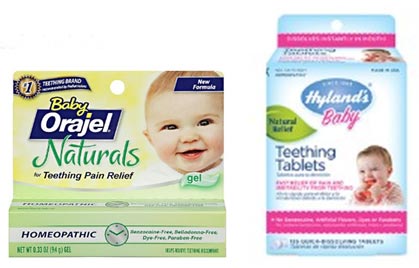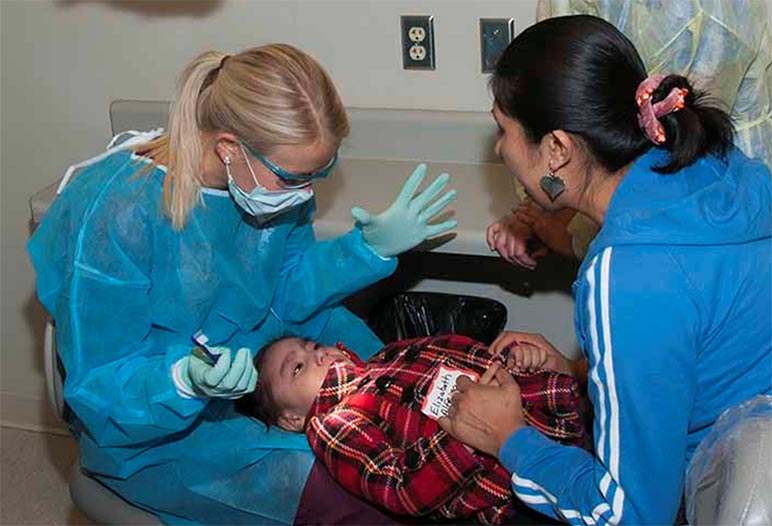Our Take on The Recent FDA Warning Against the Use of Homeopathic Teething Tablets and Gels
This is definitely an important read for parents and caregivers of infants. On September 30th, 2016, the U.S. Food and Drug Administration came out with a statement warning parents and consumers that store-bought homeopathic teething tablets and gels may pose a risk to teething infants and children who have consumed such products. In the statement, the FDA recommended that parents and caregivers discontinue use of these products and to dispose of them.
What is the risk, you ask…? There have been reports of infants and children experiencing seizures, having difficulty breathing and shortness of breath, demonstrating excessive sleepiness, muscle weakness, skin flushing and fevers, constipation and difficulty urinating, as well as irritability and agitation after using homeopathic teething tablets or gels. The FDA has quantified the events and announced that such teething tablets and gels may be linked to 400 reported adverse events and even 10 deaths.
Specific homeopathic agents that have been labeled as unsafe include:
- Hyland’s Baby Teething Tablets
- Hyland’s Baby Teething Tablets Nighttime
- Hyland’s Baby Teething Gel
- Baby Orajel Naturals
Most drugstores, as well as grocery stores, have already pulled these homeopathic teething agents and gels off the shelves, but for those consumers who have already purchased them, it is advised that they throw them away.
 The American Academy of Pediatrics recommends that instead of teething tablets or gels, parents and caregivers massage their infant’s gums with a clean finger if their baby seems to be in pain due to teething. Additionally, parents can give a solid teething ring or a wet washcloth that’s been chilled in the freezer for the baby to gum on. If parents are looking for a pharmacological remedy, it is okay to give a weight-appropriate dose of Children’s Tylenol.
The American Academy of Pediatrics recommends that instead of teething tablets or gels, parents and caregivers massage their infant’s gums with a clean finger if their baby seems to be in pain due to teething. Additionally, parents can give a solid teething ring or a wet washcloth that’s been chilled in the freezer for the baby to gum on. If parents are looking for a pharmacological remedy, it is okay to give a weight-appropriate dose of Children’s Tylenol.
Here’s the low-down on teething from the American Academy of Pediatric Dentistry:
Teething can lead to sporadic discomfort in a particular area of the mouth where teeth are about to erupt. In addition to intermittent periods of pain, infants may also experience irritability and excessive drooling. While these symptoms may manifest in some infants, many children have no apparent difficulties during the eruption process.
Treatment of teething symptoms includes pain medication taken by mouth (most commonly Children’s Tylenol or Children’s Motrin), or chilled rings for the infant to gum or chew. Use of numbing gels or over-the-counter teething gels is discouraged due to the potential toxicity of the products. Benzocaine, which is the active ingredient in most teething gels, can be overused, leading to toxicity or even overdose.
Our take on teething
If you find that your infant is excessively cranky and slobbery, chances are he or she may be teething. The average age for the first tooth to erupt is 6 months, however, it could be earlier (or later). Girls often will grow their baby teeth earlier than boys. You can expect your child to grow all 20 of his or her baby teeth generally by their 3rd birthday. That’s a lot of teeth. And a lot of teething! Luckily, teeth usually grow in in pairs, so the frequency of teething episodes may be reduced. Usually, the first teeth to erupt are the lower central incisors.
If teething is getting the best of you, first try massaging the gums, then try giving your child a cold teething ring. If that still isn’t cutting it, the next line of defense is over-the-counter medicines such as Tylenol or Motrin. Dosing for children’s medicines are based on their weight, so be sure to read the labels and consult with your pediatrician if you have any questions about how much medicine to give your infant.
And when in doubt, never hesitate to contact your pediatric dentist. Sometimes having your child’s dentist perform an exam on your infant during the teething periods can help you rest assured that everything is okay. The American Academy of Pediatric Dentistry recommends that children have their first dental visit within 6 months of when the first tooth erupts, or by the age of 1, whichever comes first. The old recommendation used to be by age 3, but now it’s advised to begin visits sooner. Earlier visits to the dentist allows each child to establish a “dental home” from an early age.
Infant dental exams are usually performed with the child sitting in the parent’s lap. The dentist will sit directly in front of the parent, in a knee-to-knee position to examine the infant with the infant’s head resting in the dentist’s lap. By using this “knee-to-knee” method, parents can stay close to their child and see up close what the dentist is examining. During the knee to knee exam, parents can comfort their child by holding their hands and being in the child’s direct line of sight. During the infant exam, you can expect your pediatric dentist to count all teeth present, inspect soft tissues, such as the gums, tongue, and lips, demonstrate toothbrushing, and apply fluoride.
Even though many infants do not have a complete set of all 20 baby teeth by their first dental visit, this initial appointment gives the dentist and the parent ample time to discuss topics including teething, timing and sequence of tooth eruption, pacifier use, diet, causes of cavities and tooth pain, fluoride supplementation, trauma prevention, and address any other questions parents may have about their child’s oral health.
These early dental visits allow infants and small children to become more familiar with the office atmosphere, where they will begin to recognize our staff and the overall setting of our dental practice. With visits every 6 months, our goal is to make our office a recognizable place. Regular dental checkups with your pediatric dentist at an early age encourage the development of healthy oral habits and as well as good home care routines, which will make future dental visits and treatment much more pleasant.
If you’d like to schedule an infant exam for your child with our pediatric dentist, Dr. Dana Fox, give our office a call at 503-223-5039.

